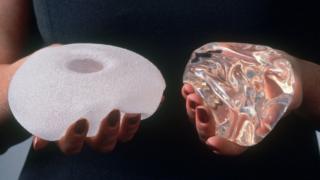 Image copyright
Image copyright
SOUTHERN ILLINOIS UNIVERSITY/SCIENCE PHOTO LIBRARY
About one in three NHS clinics and one in four private ones offering breast implant surgery in England have not submitted any patient data to a national safety registry.
NHS Digital set up the service in 2016 after the PIP (Poly Implant Prothese) breast implants scandal.
Poor record-keeping at the time of the scandal meant many of the thousands of women affected were unable to find out if they had been given faulty implants.
The register is non-compulsory.
Women in England who have had breast implant surgery are being urged to make sure their details are added to the Breast and Cosmetic Implant Registry so that they can be easily traced if something were to go wrong with any brand of implant.
The PIP implants scandal
PIP breast implants were withdrawn from the UK in 2010 after it was found they had been fraudulently made in France with unapproved silicone gel and were far more prone to splitting and leakage than other breast implants.
Image copyright
VOISIN/PHANIE/SCIENCE PHOTO LIBRARY
It’s estimated about 47,000 British women had PIP implants fitted, and most are still living with them.
A UK report in June 2012 concluded the implants had double the rupture rate of other implants, but were not found to be toxic or carcinogenic (cancer-causing).
Setting up the Breast and Cosmetic Implant Registry was one of the recommendations of that report, by Sir Bruce Keogh.
As at the end of January 2018, 231 providers had submitted data to the registry for 12,301 patients – 38% of the submissions were from NHS providers and 62% were from the independent sector.
But 39% of NHS providers and 24% of independent providers in England had not yet submitted data for the patients they had treated since the register was launched in October 2016.
All providers of breast implant surgery are expected to offer this service to their patients.
Patients need to sign a consent form to join the secure, confidential register.
It is not clear if patients treated by certain providers refused consent or were simply not asked.
The register logs:
- NHS number
- family name
- first name
- postcode
- date of birth
- surgeon’s details
- details of the surgical procedure
- details of the implant used
- any repeat operations needed related to the implant
Patients who had surgery before October 2016 can still be included as long as their provider remains in business and retains their notes.
Health Minister Jackie Doyle-Price said: “It’s vital that patients undergoing breast implant procedures encourage their surgeons to record their details on the registry, to safeguard their health.
“The confidential record allows patients to be contacted if their safety is at risk and will hopefully give people the confidence they need when making decisions on surgery.”
Rajiv Grover, of the British Association of Aesthetic Plastic Surgeons, said it was quick and simple for health professionals to register their patients’ records.
And he hoped more women would be happy to join the register.
“The PIP scandal underlines the importance of having a national register,” he said.
“Had there been one at the time, tracing the people who might need to be assessed and treated would have been much easier.”
Follow Michelle on Twitter
Women missing from breast implant register

